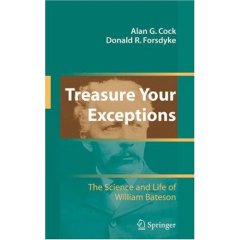|
|
|
Alan G. Cock & Donald R. Forsdyke |
|
"Treasure Your Exceptions" The Science and Life of William Bateson |
|
|
|
Alan G. Cock & Donald R. Forsdyke |
 |
 |
 |
![]()
Published by Springer (September 2008)
![]()
|
William
Bateson brought the work of Mendel (and much more) to the attention of
the English-speaking world. He commanded the biological sciences in the
decades after If this is not enough to whet your appetite, try this. In a nutshell, the book is about what we, in modern terms, would call a "colossal intelligence failure." Mendel handed it to us "on a plate" in 1865, when Bateson was only 4. It took 35 years to "join the dots" with Bateson a primary joiner. What on earth were the Darwinians doing in the interim! Shrugged off by most 20th century scientists as a freak "blip" in what was really an orderly advance, the "take home message" is that the Mendel episode was but one of a succession of such "blips." Thus, a multiplicity of post-Mendelian "Mendels" emerge as the story of Bateson's life unfolds. |
| Prologue | XI-XXV | |
| Part
1 Genesis of a Geneticist |
1 | |
| 1 | A Cambridge Childhood | 3 |
| 2 | From Virginia to the Aral Sea | 17 |
| 3 | Galton | 49 |
| 4 | Variation | 75 |
| 5 | Romanes | 111 |
| 6 | Reorientation and Controversy | 147 |
| 7 | What Life May be | 173 |
| Part II Mendelism | 195 | |
| 8 | Rediscovery | 197 |
| 9 | Mendel's Bulldog | 221 |
| 10 | Bateson's Bulldog | 265 |
| 11 | On Course | 295 |
| 12 | Darwin Centenary | 312 |
| 13 | Chromosomes | 339 |
| Part III The Innes Years | 379 | |
| 14 | Passages | 381 |
| 15 | Eugenics | 419 |
| 16 | War | 439 |
| 17 | My Respectful Homage | 469 |
| 18 | Limits Undetermined | 495 |
| Part IV Politics | 519 | |
| 19 | Butler | 521 |
| 20 | Pilgrimages | 559 |
| 21 | Kammerer | 567 |
| 22 | Science and Chauvinism | 585 |
| 23 | Degrees for Women | 601 |
| Part V Eclipse | 621 | |
| 24 | Bashing | 623 |
| 25 | Epilogue | 643 |
| Appendix | 667 | |
| Publications of William Bateson | 673 | |
|
References and Notes |
681 | |
| Acknowledgements | 711 | |
| Index | 713 -745 | |
ISBN: 978-0-387-75687-5 45 illustrations Approx. $59.00 £44.95
![]()
|
Read the Reviews Peter Harper's Review in Human Genetics (2009) 125, 233-234
Michael J. Wade's Review in Evolution (2009) 63, 2768-2770
Elof Axel Carlson's Review in Quarterly Review of Biology (2009) 84, 398-399
Joel S. Schwartz's Review in Choice 46 (7) March 2009
Amitabh Joshi's Review in Journal of Genetics (2010) 89, 555-557
|
![]()
Return to: HomePage (Click Here)
Go to: Evolution Page (Click Here)
Go to: Bioinformatics Page (Click Here)
Go to: "Treasure Your Exceptions" Corrections Page (Click Here)
Go to: Bateson Web-Pages (Click Here)
![]()
This page was established in October 2007 and was last edited 21 Jul 2013 by D. R. Forsdyke.
The above photograph of Bateson may be found in the three main archives of the Bateson papers:
1. Originals in the Cambridge University Library.
2. Copy at the John Innes Centre.
3. Alan Cock's personal copy now in the Queen's University Archives.